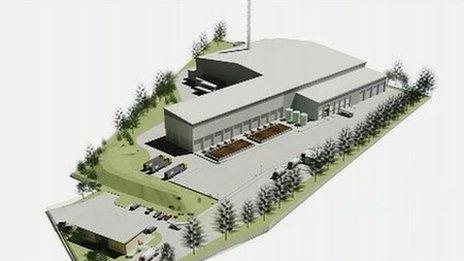Sinfin incinerator go ahead 'not the end of the road'
- Published

The plant would slowly heat material to release gas, which would then be burned to create electricity
Plans for a waste incinerator in Derby have been approved by the city council.
The site on Sinfin Lane, which would burn more than 190,000 tonnes of waste a year, was first proposed in 2009.
The plans were initially turned down by the council, before being approved at a public inquiry. Friends of the Earth and a residents' group then mounted an unsuccessful High Court challenge.
The city council's cabinet has agreed to pursue the development but campaigners have vowed to fight it.
Simon Bacon, chairman of Sinfin, Spondon and all Against Incineration said they could yet appeal the court ruling.
'Costs the taxpayer'
He said: "It's been a long and winding road. We are at the point now where a ruling has been made against us in court but we still have a potential option of appealing that decision.
"It's not the end of the road."
The facility is part of a 27-year waste management agreement between the city and county councils and private firm Resource Recovery Solutions.
The firm said the plant could be built and operated without "significant risk" to public health.
The plant would slowly heat material to produce a gas that could be burned to create electricity.
Councillor Ranjit Banwait, a member of the Labour cabinet, said the approval was subject to the project being financially viable.
A further report about this will go before the council in the summer.
"There are still challenges to be had," Mr Banwait said.
"This is about dealing with our city's rubbish. At the moment, it's landfill and that just can't go on. For every delay we go through, it costs the taxpayer."
Councillor Philip Hickson, the Conservative former leader of the council, sat on the planning committee that turned down the initial plans and said he would call for a full debate on the proposals.
"We still think there are actual health risks and fear of perceived health risks associated with this project," Mr Hickson said.
- Published16 March 2013
- Published4 November 2012
- Published22 September 2012
- Published12 June 2012
- Published5 July 2011
- Published17 March 2011